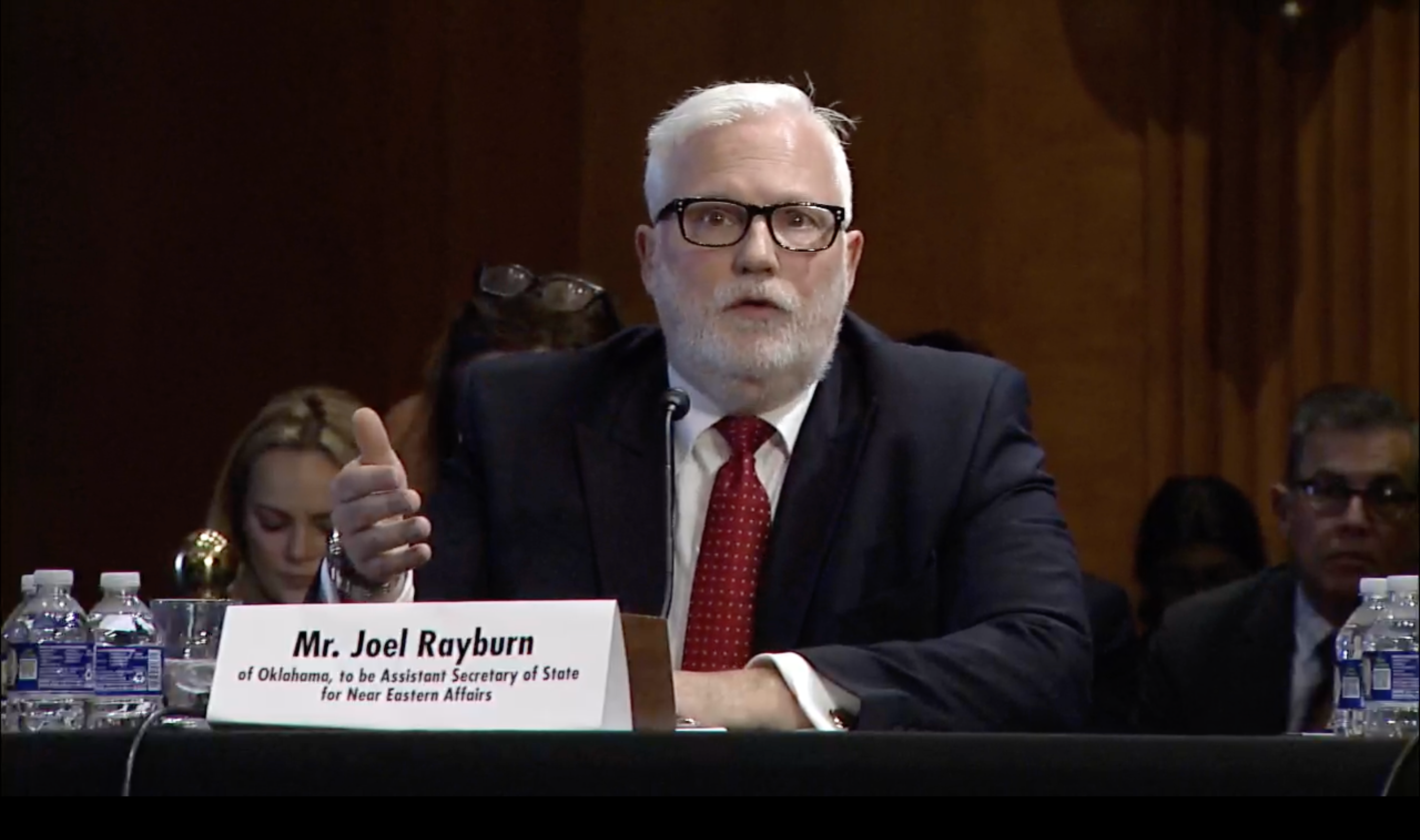President Donald Trump withdrew the nomination of Joel Rayburn to lead the State Department’s Near Eastern affairs bureau, leaving the office in the hands of a controversial interim leader.
The primary obstacle to Rayburn’s nomination appears to have been his role in the first Trump administration working under James Jeffrey, who later admitted to misleading Trump about the number of U.S. troops in Syria in an effort to prevent a military withdrawal from the country. Sen. Rand Paul (R-Ky.) grilled Rayburn in his confirmation hearing over his ties to Jeffrey, whose actions Paul described as “tantamount to treason.”
Rayburn also appeared to be at odds with the Trump administration’s broader approach to Syria. Under special envoy Tom Barrack, the U.S. has pushed hard to engage the government of President Ahmed al-Sharaa, a former jihadist fighter who claims to have moderated his views. U.S. efforts have included increased cooperation with Sharaa’s government on anti-ISIS measures as well as a full-court press in Congress to repeal crippling sanctions on Syria.
But Rayburn has been more skeptical of the potential fruits of engagement. Shortly after the fall of the Assad regime in December of last year, he tweeted that Sharaa “must be delusional” if he thinks Syrians will “sit still as he installs himself as another dictator in Assad’s place.” The Economist reported days later that Rayburn hoped to pressure Sharaa’s government by keeping sanctions in force. As of May, Rayburn remained one of the leading skeptics of engagement in Trump’s orbit, according to a CNN report. (Rayburn repeatedly insisted during his confirmation hearing that he would enact Trump’s policy toward Syria.)
The Trump administration has yet to give a reason for withdrawing Rayburn’s nomination. The decision to pull Rayburn from consideration comes just a week after the Senate Foreign Relations Committee voted to advance his nomination to the full Senate.
The move contributes to a sense of uncertainty in the State Department’s Middle East bureau, which has experienced infighting under the leadership of Mora Namdar, who is serving as an interim leader for the office as she awaits confirmation to a consular position. Reports indicate that Namdar, an Iran hawk who worked in a media role in the first Trump administration, has elevated loyalists and sidelined more experienced diplomats.
“If you’re not inside her specific circle, you’re truly left out,” a source with knowledge of Namdar’s management style told RS, adding that Namdar’s “game of promotions and demotions” has “affected the morale of the NEA staff.”
“Instead of having experts in leadership positions, people who are either chummy with Mora or have specific ideological viewpoints end up being elevated over people who have done their time and their work in specific areas,” the source said. Notably, long-time State official Timothy Lenderking left NEA in August and moved to a less prominent bureau in the department, though it is unclear whether Namdar had a hand in that move.
In response to previous reporting on this topic, the State Department defended Namdar and said she is “elevating personnel who have proven that they have the merit, expertise and experience to best implement President Trump’s agenda.”
Namdar faced similar accusations during the first Trump administration, when she worked in the U.S. Agency for Global Media, which previously oversaw several U.S.-funded news sites. A State Department inspector general report found that, in order to justify the firing of several senior executives at USAGM, Namdar told an official to create a “risk profile” of the employees with “any negative information he had heard about the individuals, regardless of whether he could verify the information.” Namdar “told him to add even rumors that he ‘heard in the halls,’” according to the report.
While outside government, Namdar sharply criticized the Biden administration for attempting to negotiate with Iran, urging the U.S. to impose “sweeping sanctions” on Iranian officials, who she claimed were carrying out a “genocide” against the Iranian people. Earlier this year, anonymous officials accused Namdar of interfering in the collection of information about Iran, including one incident in which she ordered memos to be rewritten in order to be “more pessimistic toward the Iranian government’s prospects,” according to the Washington Post.
It remains unclear how long Namdar will remain in her interim position. Last week, she went before the Senate Foreign Relations Committee for a hearing about her nomination to serve as assistant secretary of state for consular affairs, but her confirmation to that position could still take months. In the meantime, Trump has yet to indicate who may replace Rayburn as the nominee for the influential job that Namdar now holds.
















